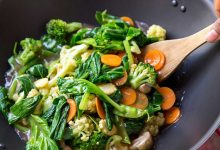Treatment and prevention of influenza escalation with food
In diseases like the flu, people usually aren’t eager to eat, but there are a few foods that can help them recover. To make the body strong and hydrated and to recover faster after catching the flu, you should consume enough tonic foods and fluids.

Soup made with chicken
Researchers have found that chicken soup ingredients fight inflammation and reduce inflammation responses to disease. Furthermore, chicken soup opens the nose and throat, making it easier to breathe.
As well as being tonic, vegetable soups are easy to digest, can be prepared easily, and also contain water, which increases hydration in the body.
Garlic
This substance also has antiviral and antibacterial properties, helping to improve the immune system and combat infections such as the flu and colds.
In an experiment, 146 patients were tested for three months, and the results showed that garlic could improve colds and the flu within a short period of time.
Foods containing vitamin C
Vitamin C-rich fruits and vegetables can boost your immune system. These foods contain high levels of vitamin C:
Peppers of any color, spicy or sweet
Orange juice or orange juice
Grapefruit
Kiwi
Citrus like lemons.
Raspberries in blue, red, and purple colors
Purple or red grapes
Raw broccoli
Leafy and raw vegetables
There are many health benefits associated with fruits containing vitamin C, including the fact that flavonides lower the risk of respiratory problems and infections.
-Ginger
Ginger reduces nausea during the flu, and its digestive properties improve digestion. Pregnant women can also use it to eliminate vomiting.
Ginger powder can be added to your meals in very small amounts, as well as poured into hot water with honey and lemon and made into herbal tea.
-Vegetables
The fiber in vegetables improves digestion, and vegetables also contain nutrients such as:
Vitamin C
Iron
Folic acid
In addition to improving immune function, these substances also have antibacterial and anti-inflammatory properties that will help the body improve faster.
– Oatmeal
This nutrient is also a rich source of fiber, which contains beneficial bacteria.
When bananas are consumed with barley, fiber and vitamins such as potassium can be increased in the body.
Additionally, it can eliminate fever, diarrhea, and vomiting in people with colds or the flu.
– Tasteless food
Food tastes bland and nauseating when you have the flu. Toast or brown rice, which are tasteless themselves, are easier to consume.
You can ensure that your body receives enough minerals and vitamins by combining these two ingredients with soups and meals.
– Yogurt
Yogurt contains live bacteria that can fight the flu. A rich source of protein, yogurt is also a good source of calcium, and dairy consumption can exacerbate flu symptoms by increasing sputum production.
– Liquids
Keeping the body moist is one of the most important things a person can do when fighting the flu. This will facilitate the following fluids:
Drinking enough water enhances the rate of kidney recovery by ejecting excess body material.
Coconut water contains potassium, sodium, and chloride. As a result of sweating, vomiting, and diarrhea, the body loses electrolytes, which can be replaced by drinking coconut water.
Ginger in this drink reduces nausea in a person. Warm water with honey, lemon, and ginger reduces nausea in a person.
Dairy
Studies show that dairy consumption increases histamine and exacerbates cold and influenza symptoms; however, some patients believe that drinking warm milk, especially with honey, relieves symptoms.
Brews made from herbs
Herbal brews have special health benefits. In addition, boiled mint or oregano or rosemary extract reduces respiratory complications, especially coughing, and borage decoction reduces fever. Due to its warm nature and antimicrobial properties, ginger tea is very beneficial in treating colds and the flu.
Spices
Spices should be avoided during illness. Some spices (especially spices) can cause coughing, so it is best to avoid them until your illness is over, but peppers can be used in cooking foods to alleviate influenza if you do not stimulate the cough. Turmeric has antimicrobial properties and garlic strengthens the immune system.
Supplementation is necessary?
Many supplements, especially B vitamins, vitamins A, C, E, D, folic acid, and pantothenic acid, as well as minerals such as zinc, copper, and selenium, claim to reduce the incidence of influenza. Only vitamin C and zinc have shown a noticeable effect. In any case, supplementation should be accompanied by a doctor’s recommendation. These vitamins can be found in food sources themselves.
Foods to avoid:
Processed foods contain high levels of sodium, causing dehydration, as well as sugar, causing inflammation.
Foods high in fat slow digestion.
Lactose in dairy products is hard to digest, so if a person suffers from severe nausea and produces more sputum after dairy consumption, he should not consume it.
Foods with sharp edges and too much stiffness can scratch the throat and aggravate irritation.
– Chicken soup
Researchers have found that chicken soup ingredients fight inflammation and reduce inflammation responses to disease. Furthermore, chicken soup opens the nose and throat, making it easier to breathe.
As well as being tonic, vegetable soups are easy to digest, can be prepared easily, and also contain water, which increases hydration in the body.
Flu shouldn’t be eaten
– Garlic
This substance also has antiviral and antibacterial properties, helping to improve the immune system and combat infections such as the flu and colds.
In an experiment, 146 patients were tested for three months, and the results showed that garlic could improve colds and the flu within a short period of time.
– Foods containing vitamin C
Vitamin C-rich fruits and vegetables can boost your immune system. These foods contain high levels of vitamin C:
Peppers of any color, spicy or sweet
– Orange juice or orange juice
– Grapefruit
-Kiwi
– Citrus like lemons.
– Blue, red and purple raspberries
– Purple or red grapes
– Raw broccoli
– Leafy and raw vegetables
There are many health benefits associated with fruits containing vitamin C, including the fact that flavonides lower the risk of respiratory problems and infections.
-Ginger
Ginger reduces nausea during the flu, and its digestive properties improve digestion. Pregnant women can also use it to eliminate vomiting.
Ginger powder can be added to your meals in very small amounts, as well as poured into hot water with honey and lemon and made into herbal tea.
-Vegetables
The fiber in vegetables improves digestion, and vegetables also contain nutrients such as:
– Vitamin C
-Iron
– Folic acid
In addition to improving immune function, these substances also have antibacterial and anti-inflammatory properties that will help the body improve faster.
– Oatmeal
This nutrient is also a rich source of fiber, which contains beneficial bacteria.
When bananas are consumed with barley, fiber and vitamins such as potassium can be increased in the body.
Additionally, it can eliminate fever, diarrhea, and vomiting in people with colds or the flu.
– Tasteless food
Food tastes bland and nauseating when you have the flu. Toast or brown rice, which are tasteless themselves, are easier to consume.
You can ensure that your body receives enough minerals and vitamins by combining these two ingredients with soups and meals.
-Yogurt
A person can fight the flu with yogurt because it contains live bacteria. As well as being a rich source of protein, yogurt is also a good source of calcium, and dairy consumption can cause an increase in sputum, which can exacerbate flu symptoms.
-Liquids
Keeping the body moist is one of the most important things a person can do when fighting the flu. This will facilitate the following fluids:
Drinking enough water enhances the rate of kidney recovery by ejecting excess body material.
Coconut water contains potassium, sodium, and chloride. As a result of sweating, vomiting, and diarrhea, the body loses electrolytes, which can be replaced by drinking coconut water.
Ginger in this drink reduces nausea in a person. Warm water with honey, lemon, and ginger reduces nausea in a person.
Dairy
Studies show that dairy consumption increases histamine and exacerbates cold and influenza symptoms; however, some patients believe that drinking warm milk, especially with honey, relieves symptoms.
Brews made from herbs
Herbal brews have special health benefits. In addition, boiled mint or oregano or rosemary extract reduces respiratory complications, especially coughing, and borage decoction reduces fever. Due to its warm nature and antimicrobial properties, ginger tea is very beneficial in treating colds and the flu.
Spices
Spices should be avoided during illness. Some spices (especially spices) can cause coughing, so it is best to avoid them until your illness is over, but peppers can be used in cooking foods to alleviate influenza if you do not stimulate the cough. Turmeric has antimicrobial properties and garlic strengthens the immune system.
Supplementation is necessary?
Many supplements, especially B vitamins, vitamins A, C, E, D, folic acid, and pantothenic acid, as well as minerals such as zinc, copper, and selenium, claim to reduce the incidence of influenza. Only vitamin C and zinc have shown a noticeable effect. In any case, supplementation should be accompanied by a doctor’s recommendation. These vitamins can be found in food sources themselves.
Foods to avoid:
Sodium and sugar in processed foods cause dehydration and inflammation, respectively.
Foods high in fat slow digestion.
Lactose in dairy products is hard to digest, so if a person suffers from severe nausea and produces more sputum after dairy consumption, he should not consume it.
Foods with sharp edges and too much stiffness can scratch the throat and aggravate irritation.


